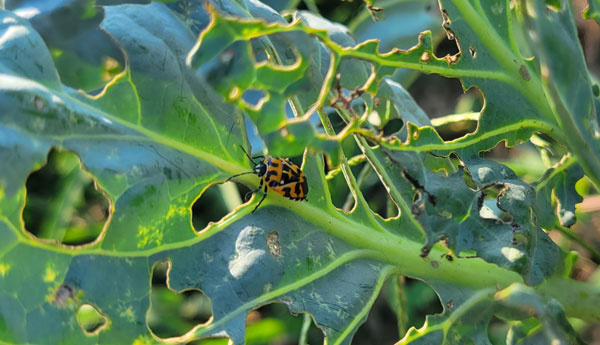
Harlequin bugs. You can’t live with ’em, and it would certainly be more pleasant to live without them! Unlike their carnival-esque name, these mid-sized little garden pests are no laughing matter. Feasting primarily upon cabbage, broccoli and brussels sprouts–or basically any brassica they can find–these bugs tend to show up in clusters, leaving a path of destruction in their wake. Leaves are their main target, shredding them into skeletonized shadows of their former selves. So how best to keep them away? Check out a few suggestions below.
Resistance
One of the main issues with defeating harlequin bugs is their resilience. Belonging to the Pentatomoidea family of bugs–more commonly known as stinkbugs–they can excrete a foul liquid, and have hard exoskeletons making them more invulnerable to attack. This means they;re not the preferred snack for many garden predators.
Fighting Back
Neem Oil
A widely used favorite to eliminated Harlequin bugs is by spraying plants with Neem oil. The insects absolutely hate the smell, and it will keep them a country mile away. The only downside, is beneficial bugs like pollinators also hate neem oil, so take care which plants you squirt it on.
Insecticidal Soap
Insecticidal soap is always a nice, all-natural option. Packed with potassium salts of fatty acids, bugs hate this stuff. You can even make some yourself with a little apple cider vinegar (1 tsp), ground garlic (1 tsp), warm water (1 quart), and pure liquid soap (1 tsp; NOT DETERGENT). The same warning about pollinators applies here, as it does for Neem oil.
Destressing Plants
Sounds odd, right? I thought so too, but it turns out, that when your plants are stressed, they send out distress signals in the form of chemicals, that Harlequin bugs absolutely love. This is one of the reasons they love brassicas so much, as when the weather warms, the plants immediately start sending out said signals. Obviously, if you’re trying to get the last bits out of your cold-weather crop in a warm weather season, this isn’t terribly helpful news. But for other sorts of plants, you can cut down on the amount of harlequins you attract by weeding out old and sickly plants. Less distress signals means fewer bugs.
Diatomaceous Earth
Diatomaceous earth is uniquely targeted to take down Harlequins. It will strip the waxy coating from their exoskeletons, dehydrating and then killing them. Spread it accordingly.
Companion Plants
Harlequin bugs hate borage, garlic, mint, and other such highly aromatic plants. Putting them nearby should cut down on your colonies drastically.
Destroying Habitat
While this doesn’t help you too much at the moment, the bugs have a low resistance to cold weather. As such, if they have a foothold in your garden, rake your mulch back over the winter months. This will expose them to the frigid temperatures, killing them.
Hopefully the tips above can help you a bit in your war against the Harlequins. These little pests can be a real nightmare when they take hold, so good luck!
A humble homesteader based in an undisclosed location, Lars Drecker splits his time between tending his little slice of self-sustaining heaven, and bothering his neighbors to do his work for him. This is mainly the fault of a debilitating predilection for fishing, hunting, camping and all other things outdoors. When not engaged in any of the above activities, you can normally find him broken down on the side of the road, in some piece of junk he just “fixed-up.”
